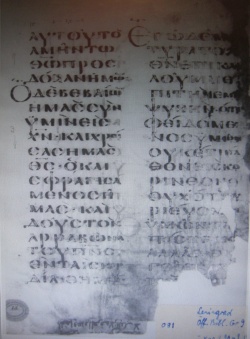Codex Tischendorfianus II
From Textus Receptus
| Line 1: | Line 1: | ||
::''For the similarly named manuscript [[Codex Tischendorfianus III]] [[Codex Tischendorfianus IV]]'' | ::''For the similarly named manuscript [[Codex Tischendorfianus III]] [[Codex Tischendorfianus IV]]'' | ||
| + | [[Image:Uncial_081,_2_Cor_1,20-24.JPG|thumb|right|250px|Fragment with text of 2 Cor 1:20-24]] | ||
'''Codex Tischendorfianus II''' – designated by '''Uncial 081''' (in the [[Biblical manuscript#Gregory-Aland|Gregory-Aland numbering]]) α 1023 ([[Biblical manuscript#Von Soden|Soden]]),<sup>[1]</sup> – is a Greek [[uncial]] [[manuscript]] of the [[New Testament]], dated [[Paleography|paleographically]] to the 6th century. | '''Codex Tischendorfianus II''' – designated by '''Uncial 081''' (in the [[Biblical manuscript#Gregory-Aland|Gregory-Aland numbering]]) α 1023 ([[Biblical manuscript#Von Soden|Soden]]),<sup>[1]</sup> – is a Greek [[uncial]] [[manuscript]] of the [[New Testament]], dated [[Paleography|paleographically]] to the 6th century. | ||
Revision as of 10:49, 12 June 2016
- For the similarly named manuscript Codex Tischendorfianus III Codex Tischendorfianus IV
Codex Tischendorfianus II – designated by Uncial 081 (in the Gregory-Aland numbering) α 1023 (Soden),[1] – is a Greek uncial manuscript of the New Testament, dated paleographically to the 6th century.
Contents |
Description
The codex contains a small part of the Second Epistle to the Corinthians 1:20-2:12 on 2 parchment leaves (28 centimetres (11 in). The text is written in two columns per page, 18 lines per page,[2] in a large uncial letters.[3] It is elegantly written, without breathings and accents.[4] It uses diaeresis (Ϊ and Ϋ).[3]
This manuscript was a part of the same codex to which Uncial 0285 belonged.
The Greek text of this codex was influenced by the Alexandrian text-type with some alien readings. Aland placed it in Category II.[2]
In 2 Corinthians 2:2 it contains reading και τις εστιν (as א2 D F G Ψ) for και τις (as א* A B C 81).[5]
History
Currently it is dated by the INTF to the 6th century.[2][6]
Tischendorf brought this codex from the East to Petersburg in 1859.[3] Tischendorf briefly described it in Notitia editionis codicis Bibliorum Sinaitici (Leipzig, 1860).[7] It was examined by Eduard de Muralt.[8] It was examined by Kurt Treu and Pasquale Orsini.
The codex now is located at the Russian National Library (Gr. 9) in Saint Petersburg.[2]
See also
References
- 1. Gregory, Caspar René (1908). Die griechischen Handschriften des Neuen Testament. Leipzig: J. C. Hinrichs'sche Buchhandlung. p. 39.
- 2. Aland, Kurt; Aland, Barbara; Rhodes, Errol F. (trans.) (1995). The Text of the New Testament: An Introduction to the Critical Editions and to the Theory and Practice of Modern Textual Criticism. Grand Rapids: William B. Eerdmans Publishing Company. p. 120. ISBN 978-0-8028-4098-1.
- 3. C. R. Gregory, "Textkritik des Neuen Testaments", Leipzig 1900, vol. 1, p. 118
- 4. F. H. A. Scrivener, A Plain Introduction to the Criticism of the New Testament (London 1894), vol. 1, p. 184
- 5. NA26, p. 474
- 6. "Liste Handschriften". Münster: Institute for New Testament Textual Research. Retrieved 21 April 2011.
- 7. C. von Tischendorf, Notitia editionis codicis Bibliorum Sinaitici (Leipzig 1860), p. 50.
- 8. E. de Muralt, Catalogue des manuscrits grecs de la Bibliothèque Impériale publique (Petersburg 1864)
Further reading
- C. von Tischendorf, Notitia editionis codicis Bibliorum Sinaitici (Leipzig 1860), p. 50.
- Kurt Treu, Die Griechischen Handschriften des Neuen Testaments in der USSR; eine systematische Auswertung des Texthandschriften in Leningrad, Moskau, Kiev, Odessa, Tbilisi und Erevan, T & U 91 (Berlin: 1966), pp. 24–25.

